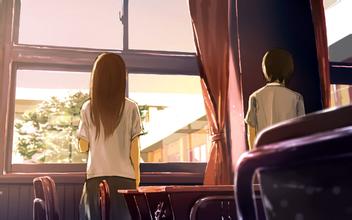LESSON 60 True courage
第六十课 真正的勇敢
A teacher had been much annoyed by some of his boys whistling during school hours. At last he was obliged to threaten with punishment any one who should repeat the offence.
从前,有一个老师,他很为学生们在上课期间吹口哨所烦恼。最终,他被迫威胁说对任何再次冒犯的人进行惩罚。
The next morning, when the room was very quiet, a loud whistle was heard! The scholars were very much startled, and the teacher at once looked around to discover the offender.
第二天早晨,就在教室里很安静时,突然传来一声很响的口哨声!学生们都很震惊,老师则马上四处观望寻找肇事者。
The blame fell on a bad boy who was often in mischief. When charged, he strongly denied the act: yet his words were not believed, for I am sorry to say he was not a truthful boy; so the master brought him up for punishment.
责任被归于一个经常恶作剧的不良少年身上。被指控时,他极力否认。然而,大家都不信他的话,很遗憾地说,他不是一个诚实的孩子。所以老师对他进行了惩罚。

Seeing what was about to take place, a slender little fellow, about nine years old, who had been anxiously watching the proceedings, sprang from his seat.
看到即将发生的事情,一个大约九岁的身材瘦小的小孩站了起来,他刚刚不安地看着审问的过程。
"Do not punish John, sir," he said to the teacher. "It was I who whistled. I was doing a long, hard sum, and in rubbing out another sum to make room for it, I rubbed out the difficult one by mistake. I spoiled it all, and before I remembered where I was, I had whistled right out, sir! I am very, very sorry, sir; I did not mean to whistle, but I cannot let John be punished for my fault." And with all the firmness he could command, the little fellow held out his hand to be punished!
他对老师说“请不要惩罚约翰,先生,是我吹的口哨。刚刚我正在做一个又长又难的加法,我擦去另一个式子给它腾空时不小心把难的式子擦掉了。我把所有的搞砸了,当我意识到我在哪之前,我已经吹了口哨,先生!真的很抱歉,先生!我不是故意吹口哨的,但我不能让约翰因为我的错误被惩罚。”然后,在所有人的肯定中,这个小孩举起手准备接受惩罚。
Taking the little boy's hand, the teacher said, "Charles, you have done right. No one can doubt that you have spoken the truth, and that you did not intend to whistle. I cannot punish you, my boy, after having acted so nobly."
老师抓住小孩的手说:“查尔斯,你做得对。没有人能怀疑你说谎,而且你不是故意吹的口哨。我的孩子,在你表现这么好后,我不能惩罚你。”
Charles returned to his seat with a flushed face, and even the youngest child in the school felt proud of him; for every scholar could see how bravely he had acted.
查尔斯红着脸回到座位上。即使是学校里最小的孩子也为他感到骄傲,因为每个学生都可以看到他表现得多勇敢。
Charles was truly a brave boy. He had done that which he knew to be right, even though at the time it might have brought suffering upon himself.
查尔斯真的是一个勇敢的男孩。他做了他认为正确的事,即使这时他可能使自己受苦。
True courage may also be shown by refusing to do that which we know to be wrong, though bad companions may laugh at us, and call us cowards, for saying No.
勇敢也表现为拒绝做自己认为错的事,虽然坏伙伴可能会因为我们说不而嘲笑我们,把我们称作胆小鬼。
QUESTIONS
问题
What had annoyed the teacher? What was the teacher obliged to do? What was heard next morning? What did the teacher then do? Upon whom did the blame fall? Why were the words of the bad boy not believed? Who sprang from his seat? What did this boy say? What was the teacher's reply? What were the feelings of the children? How was Charles a brave boy? How may true courage be shown?
是什么使老师烦恼?老师被迫做了什么?第二天早晨听到了什么?接着老师做了什么?责任落到了谁的身上?为什么大家不信那个坏孩子的话?谁从他的座位上站了起来?这个男孩说了什么?老师的回答是?孩子们是什么感受?查尔斯是如何成为一个勇敢的男孩的?真正的勇敢可以如何体现?











